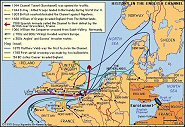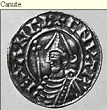Saxon Times
On again to Saxon times, after the Romans had withdrawn from Britain to defend their crumbling empire, and the written evidence starts to appear. Tutbury was becoming quite important by now, as the Iron Age fort was adapted, improved and strengthened.
In the early part of this period England was still a number of separate kingdom. This part of the country came under Mercia and in about 500 AD Offa (of the dyke between England and Wales) was King of Mercia and he had his residence at Tutbury.
So now Tutbury is what we would call the capital of Mercia and here is the first royal connection of which we'll hear much more in a little while.
In 700 AD Ethelred l was king of Mercia and he also resided in Tutbury. The kings in between tended to move around quite a lot to fight wars and so on.
 Now
in the 8th and 9th centuries the Vikings came on their raiding trips.
Now
in the 8th and 9th centuries the Vikings came on their raiding trips.
Around here was right on the border of Saxon and Viking territories and the Tutbury residents of the time would have seen a lot of excitement. Again place names illustrate this very nicely.
The Viking equivalent of the Saxon 'ton' was 'by' - "a settlement" and to the East of here you find Bretby, Derby, Oadby, Smisby and dozens in Leicestershire and Lincolnshire. In 874 for instance the Vikings sailed up the Trent, wintered at Repton (which also has a lot of Anglo-Saxon history), and ravaged the surrounding countryside including the nunnery at Hanbury that King Ethelred had established with his sister St Werburgh in charge.
Being the seat of a Saxon King, Tutbury would have been a prime target and some of the Tutbury field names, particularly those near the River Dove, are of Viking origin. The Vikings remained in this area until about 920 when a lady called Aethelflaed, a daughter of King Alfred the Great and a sort of Boadicea or Margaret Thatcher figure, drove the Vikings from the area as part of a cross country running battle from her bases in Tamworth and Tutbury, where she strengthened the fortifications.
Later the Vikings returned and remained until 1002 when King Ethelred the Unready got fed up with all this. Some of the Vikings had tried to settle down but Ethelred conceived of a plan to drive them out once and for all. He tried to take them by surprise and on 13 Nov 1002 began his campaign by attacking them at Houndhill near Marchington in what was called 'The massacre of the Danes' - it sounds very bloodthirsty and probably was.
 But
it wasn't very successful in the long run as afterwards England (which was
one kingdom by now) had several Danish kings, including Canute.
But
it wasn't very successful in the long run as afterwards England (which was
one kingdom by now) had several Danish kings, including Canute.
Ethelred was only a lad - he came to the throne at the age of 10 and his nickname gives it away. 'Unready' doesn't mean that he wasn't ready, it means 'badly advised'. Anyway the Vikings were very persistent and they were only stopped in their tracks by an event that shook the whole of the country, the Norman Conquest of 1066.

